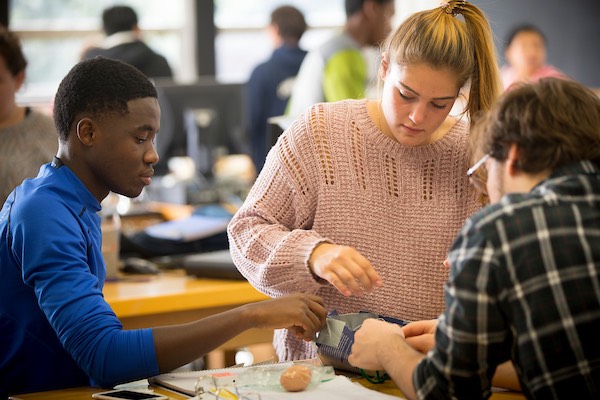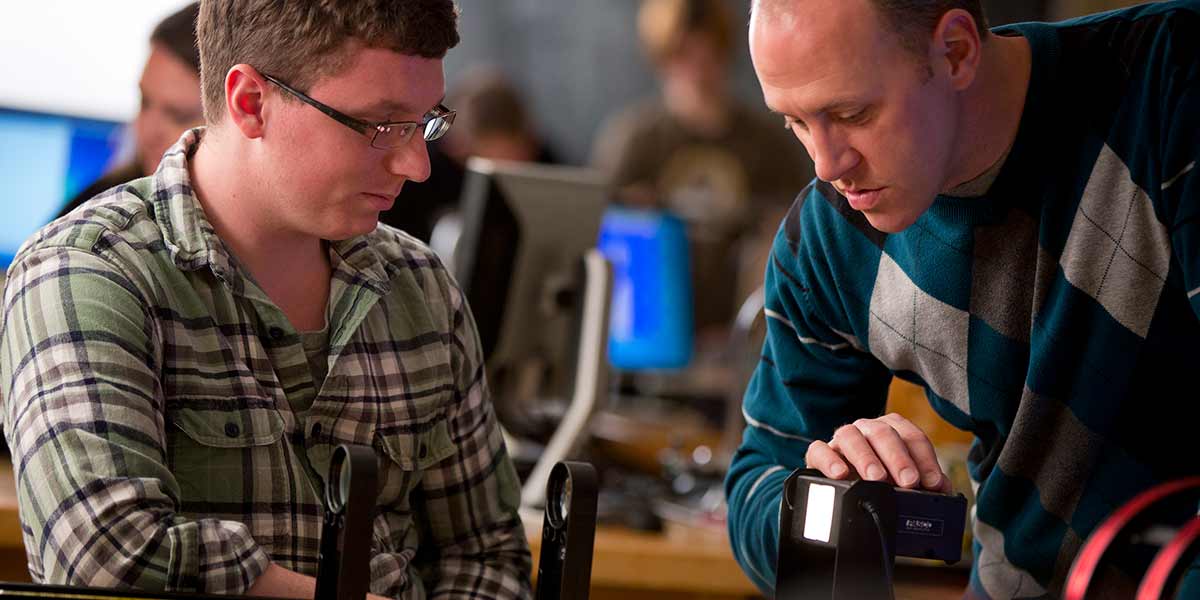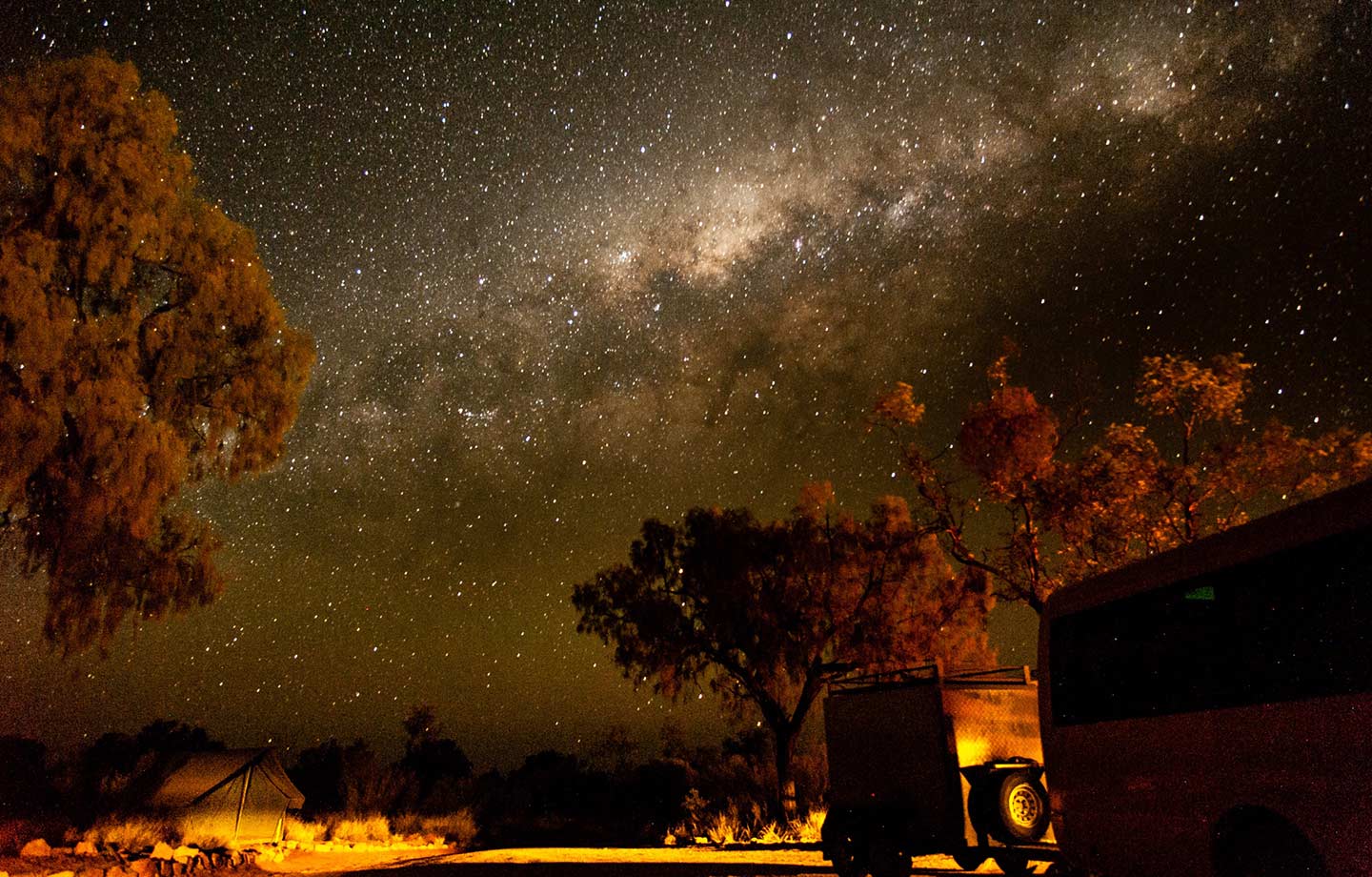
Engineering physics combines many scientific disciplines in order to provide a grounding
in applied physics. Engineering physicists develop solutions to contemporary problems,
using advanced techniques where standard approaches are not adequate.
Two distinct engineering physics opportunities are available at Juniata College:
Engineering at Juniata College: 4 year degree
This option provides a technical background for a person who wishes to seek general
employment in a technical industrial situation which does not require specific engineering
training. The mathematics sequence in these three options offers the necessary problem-solving
techniques and discipline required for the upper-level physics courses at Juniata
and the upper-level engineering courses at an engineering school.
Engineering at Juniata and Affiliate Institute: 3+2 degree
In this option, the physics, mathematics, chemistry and computer science requirements
consist of a broad introduction to the field, providing basic knowledge and initial
analytical skill development for the engineering profession. Generally, this POE option
is designed to meet the entrance requirements of the engineering schools with which
we are affiliated: Columbia University, Washington University in St. Louis, and Penn State University.
Substantial laboratory work is included in these options to insure contact with concrete phenomena.

Engineering physics combines many scientific disciplines in order to provide a grounding
in applied physics. Engineering physicists develop solutions to contemporary problems,
using advanced techniques where standard approaches are not adequate.
Two distinct engineering physics opportunities are available at Juniata College:
Engineering at Juniata College: 4 year degree
This option provides a technical background for a person who wishes to seek general
employment in a technical industrial situation which does not require specific engineering
training. The mathematics sequence in these three options offers the necessary problem-solving
techniques and discipline required for the upper-level physics courses at Juniata
and the upper-level engineering courses at an engineering school.
Engineering at Juniata and Affiliate Institute: 3+2 degree
In this option, the physics, mathematics, chemistry and computer science requirements
consist of a broad introduction to the field, providing basic knowledge and initial
analytical skill development for the engineering profession. Generally, this POE option
is designed to meet the entrance requirements of the engineering schools with which
we are affiliated: Columbia University, Washington University in St. Louis, and Penn State University.
Substantial laboratory work is included in these options to insure contact with concrete phenomena.

Engineering physics combines many scientific disciplines in order to provide a grounding
in applied physics. Engineering physicists develop solutions to contemporary problems,
using advanced techniques where standard approaches are not adequate.
Two distinct engineering physics opportunities are available at Juniata College:
Engineering at Juniata College: 4 year degree
This option provides a technical background for a person who wishes to seek general
employment in a technical industrial situation which does not require specific engineering
training. The mathematics sequence in these three options offers the necessary problem-solving
techniques and discipline required for the upper-level physics courses at Juniata
and the upper-level engineering courses at an engineering school.
Engineering at Juniata and Affiliate Institute: 3+2 degree
In this option, the physics, mathematics, chemistry and computer science requirements
consist of a broad introduction to the field, providing basic knowledge and initial
analytical skill development for the engineering profession. Generally, this POE option
is designed to meet the entrance requirements of the engineering schools with which
we are affiliated: Columbia University, Washington University in St. Louis, and Penn State University.
Substantial laboratory work is included in these options to insure contact with concrete phenomena.
Physics Facilities

Physics Facilities

Physics Facilities

Physics Facilities

Study Abroad
Studying abroad can provide you with an international perspective on the field of physics, but the major advantage has less to do with the courses specifically in the POE, and more to do with the life-broadening experience. Physics faculty lead short-term study abroad experiences to Chile and to Central Europe, and students have studied for a semester or a full year in New Zealand, England, Ireland, Ecuador, and the Czech Republic. Learn more about available programs here.
 skip to content
skip to content






